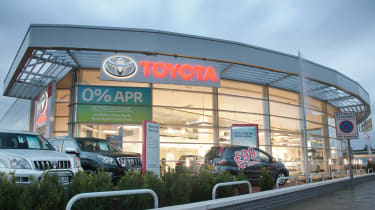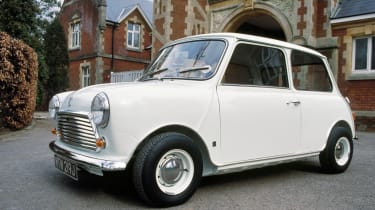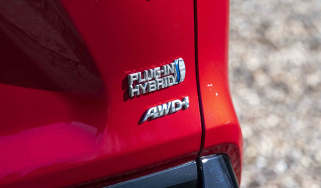Car valuations: how much is my car worth?
Knowing how much your car is worth is vital for a fair and quick sale – here are our top tips

When it comes time to sell your car, the first question you’re likely to ask yourself is: how much is my car worth? In lots of cases, this can be a bit tricky to answer – used car values depend on many factors, from age to mileage, fuel type and even paint colour.
Thankfully, you don’t have to work out your car’s value by yourself. There are plenty of websites today that will provide you with an instant valuation of your car based on the latest market data. Our sister site Auto Express offers a free car valuation tool that will provide you with a figure within minutes – you can even sell your car with Auto Express, too.
 How to buy a used car: top tips
How to buy a used car: top tips
When you decide it’s time to change cars, the first step is to figure out the best way to sell your car. You have a few options here; you could sell it privately, part-exchange with a dealer or use an online guaranteed sales service. In any case, knowing the value of your car will help you get the best deal possible.
Once you know the market value of your car, you can price it accordingly. If you need to sell a car quickly and attract buyers’ attention, you may want to put it up for a lower, more attractive price; knowing the car’s value means you’re aware of the discount you’re offering. Ask for too much, on the other hand, and you’ll find the car fails to attract any attention at all.
Getting an accurate valuation of your car can also come in useful if your car is written off and you need to know whether the insurer’s settlement is fair or not. For cars on a PCP finance plan, it also helps you make the decision to buy it outright or hand it back.
Every car has its own history and no one used car is identical to another. Each will have a unique service history, number of previous owners and total mileage – all which need to be factored in when working out a car’s value. These tips will help you find out how to get the best deal by setting an accurate price.
How much is my car worth?
Practically every new car loses value over time through a process known as depreciation. Some cars can lose as much as 60% of their original value in just three years – you can read more about the fastest depreciating cars here. As a consequence, your car is unlikely to be worth what you originally paid for it when you come to sell it.
So how much is my car worth? Well, you’ll need to consider three main variables when working out the value of your car: the vehicle’s age, mileage and condition. Other factors also have an influence, such as whether the car has an automatic or manual gearbox, and whether the car has a petrol, diesel, hybrid or electric powertrain. Market demands can have an influence on this, so valuations can go out of date in a matter of months.

It’s easy to overlook, but your car’s value also depends on where in the country it is. Used car prices tend to be higher in the south compared to the north. The time of year can also have an effect on your car’s value – you’ll find that convertible car prices go up during spring, and SUVs in autumn and winter. We have a guide to the best and worst times to sell a car if you’re interested.
Optional extras can have an effect on the price, too, depending on how desirable they are. In some cases, a lack of extras can also be detrimental to a used car's value, particularly if it’s missing an item that most similar cars came with, like alloy wheels or air-conditioning. The easiest way to determine if your car stands out from the crowd is by searching used car websites for similar examples to your own car, and seeing what the majority of vehicles similar to yours have as advertised extras – to learn more about how options can affect prices, see our guide to optional equipment.
A car sold by a dealer will be more expensive than one sold by a private individual, so bear that in mind when setting your price. A dealer has many more costs including VAT on their profit, refurbishment expenses and overheads to consider. Cars sold from dealerships also often come with extra perks like a warranty or a fresh MoT. People accept this and will pay a dealer’s higher price.

However, you can maximise the price of your vehicle by mimicking the benefits of buying from a dealer. Getting a new MoT shows potential buyers they have less chance of a costly repair within the next year. If you have any outstanding warranty on your vehicle that can be transferred to a new owner make this clear in the advert to make it even more appealing to buyers.
If your car has previously been written off by an insurer, it’s likely to be worth considerably less than the typical market value – even if it has been repaired to an excellent standard. Find out more about 'Cat N' and 'Cat S' (or ‘Cat C’ or ‘Cat D’ if the car’s a bit older) cars here.
It goes without saying that models from more prestigious brands tend to keep their value much longer – the likes of Ferrari and Porsche are among the slowest-depreciating brands in the UK. There are some more surprising everyday brands in the top 10, however, with Dacia and Toyota some of the best at keeping their value.
How do I value my car?
A good place to start when working out the value of a car is to look at prices of the same make and model on classified car ad websites. Most sites offer a way to filter by trim level, year and mileage, and some even give a rating that shows how reasonable the asking price is based on analytics of other nearly identical cars for sale.
There are also several used-car price guides you can refer to for pricing information, such as Glass’s and CAP. It’s important to bear in mind that these values represent typical asking prices, and it’s not uncommon for the final sale price to be lower after buyers haggle with sellers. Values also differ between private sellers and dealers – buying from a dealer often means people are entitled to finance packages, plus a warranty and legal protection if any issues arise, and buyers are usually willing to pay more for this peace of mind than they are from a private seller.
Bear in mind too when the car you’re selling is next due for an MoT test. A fresh MoT can be appealing to buyers, and you can probably get away with asking a little more money for the car as a result – but if issues crop up, it may also cost you hundreds to put the car through its test, and you won’t always get this money back at sale time.
What about online car valuations?
With so much to take into consideration, sometimes it’s a good idea to use an online car valuation tool. These sites help you get a quick valuation of your car by supplying just a few details. They use information about cars all over the UK which can save you manually searching for yourself.
These tools can be especially useful for more mainstream cars, because there is a range of examples to go by. However, they will be less helpful if you’re looking for a valuation of a classic or rare car – the value of these depends more on who is in the market for a specific vehicle at the time.
If you’re looking to find out how much your car is worth, you can use the free online valuation on our sister site Auto Express.
How to get the best price for a car you’re selling
As previously mentioned, you can work out the asking price for your car by comparing it to others for sale around the same mileage, year, trim level and even location. For example, cars tend to be more expensive in southern England compared with the North.
If your car is a little more niche, like a 4x4, sports car, or a classic, you might consider choosing where you advertise it a little more carefully. A website geared towards classic cars, for example, will attract buyers who are more prepared to pay a fair price for your classic, so it’s a good idea to look at prices for your car from a range of sources.
It’s also important to take into account the condition of your used car, especially a classic, since prices can fluctuate greatly depending on the quality of the paintwork, mechanical issues or presence of rust. Once again, a fresh MoT can be beneficial here, reducing any concerns a buyer might have over the condition of the car you’re selling.
How much is my classic car worth?
This is often much trickier to determine, and you may need to consult an expert on the type of car you’re selling.

The definition of a classic varies hugely around the world, with 25 years the accepted point in many countries, and FIVA, a global nonprofit dedicated to the preservation of classic and vintage vehicles, considers anything older than 30 years a historic vehicle. In the UK, anything over 40 years is considered a ‘historic vehicle’, and benefits from MoT and vehicle tax exemption. If it’s still attracting a following at this age, there’ll be a loyal band of experts who’ll help you find out a fair price, whether you’re buying or selling.
Condition is an important aspect of a classic car’s value, with the full spectrum of cars available from rusty barn finds, to good condition usable classics, all the way to complete rebuilds. History is important, and completely original cars with thick folders supplied to give buyers the story of the car's life are some of the most desirable.
Due to this wide variety, classics can be particularly hard to value. If you are selling one with an active enthusiast community it can be easier to gauge its value. Similarly, asking around in the owners clubs can be a great way to accurately estimate a number for your vehicle. Classic car specialists such as Hagerty also provide valuation tools for classic models, based on data from classic car auctions, dealer sales, and verified private sales.
In the case of a rare vehicle that may be one of only a few remaining, specialists' auctions are sometimes better than selling yourself as they will likely have seen other cars like yours before, and be able to give you a good idea of the market.
We would always advise speaking to classic experts who specialise in that marque and/or model before attempting to value your own classic.
Take your time
With all things considered, whatever type of car you’re buying or selling is worth what someone is willing to pay for it. Often the best course of action when selling is to have patience and wait until the right buyer comes along. If you’re looking to buy a car, the more you look at, the better your instincts will get at sensing how much the model should be worth and what you’re prepared to pay for it.
Importantly, if you’re not entirely sure how much to charge for a car at first, you can always start optimistically and lower the price if it’s not attracting much attention.
Similarly, don’t rush into buying a car until you’ve weighed it up against other similar options and have the full picture. Remember, the asking price is not always the final price, so don’t be afraid to make a sensible offer. The worst a seller can do is say no.
Find out how much your car is worth using the free valuation tool on our sister site Auto Express
More car selling advice
Recommended

Petrol and diesel car ban relaxed with hybrids permitted beyond 2030

Classic car tax exemption: which historic vehicles qualify?

Car warranties: guide to new and used car warranties
Most Popular

Omoda E5 targets rivals: now with zero deposit and APR

Ford Puma Gen-E driven: Electric charmer or too little, too late?
Tips & advice

Car dashboard warning lights: what does each symbol mean?

Electric car charging stations: public networks, charger types, apps and maps








